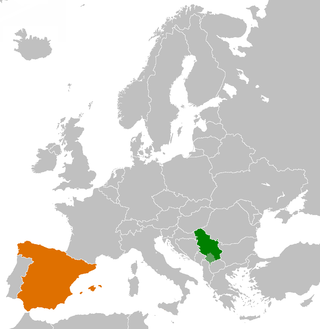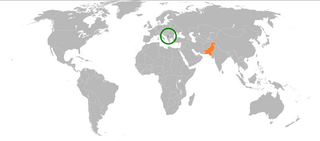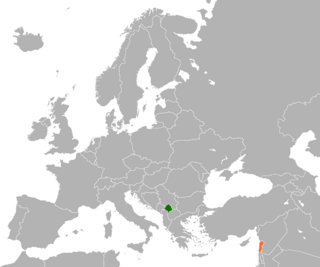
International governments are divided on the issue of recognition of the independence of Kosovo from Serbia, which was declared in 2008. The Government of Serbia does not diplomatically recognise Kosovo as a sovereign state, although the two countries have enjoyed normalised economic relations since 2020 and have agreed not to try to interfere with the other's accession to the European Union.

On 17 February 2008, the majority of members of the Assembly of Kosovo, including Hashim Thaçi, and Fatmir Sejdiu, not acting in the capacity of PISG, declared Kosovo an independent and sovereign state. Kosovo was soon recognized as a sovereign state by the United States, Turkey, Albania, Austria, Germany, Italy, France, the United Kingdom, the Republic of China (Taiwan), and others. This triggered an international debate over whether Kosovo's unilateral declaration of independence had set a precedent in international law that could apply to other separatist movements, or whether it is a special case. The recognition of Kosovo's independence by 101 out of 193 UN states, according to many sources, has given fresh impetus to other separatist movements.

Argentina and Serbia maintain diplomatic relations established between Argentina and Kingdom of Yugoslavia in 1928.

Armenia and Serbia maintain diplomatic relations established between Armenia and the Federal Republic of Yugoslavia on 14 January 1993. Both countries are members of the United Nations, Council of Europe, Organization for Security and Co-operation in Europe, NATO's Partnership for Peace, the International Monetary Fund, and the International Bank for Reconstruction and Development.

Serbia-Spain relations are foreign relations between Serbia and Spain. Both countries established diplomatic relations on October 14, 1916. Serbia has an embassy in Madrid. Spain has an embassy in Belgrade. Both countries are member states of the UN, Interpol, COE and OSCE. Spain is member state of the EU since 1986 and Serbia is a candidate country since 2012 negotiating its future membership which Spain is strongly supporting. In relation to third parties, both countries supported position of Argentina in its Falkland Islands sovereignty dispute with the United Kingdom in the past.

Kosovo's declaration of independence from Serbia was enacted on Sunday, 17 February 2008 by a unanimous vote of the Assembly of Kosovo. All 11 representatives of the Serb minority boycotted the proceedings. International reaction was mixed, and the world community continues to be divided on the issue of the international recognition of Kosovo. The Russian Federation’s reaction to the 2008 Kosovo Declaration of Independence is one of strong opposition.

Egyptian–Kosovan relations are foreign relations between Egypt and Kosovo.
Kosovo's declaration of independence from Serbia was enacted on Sunday, 17 February 2008 by a unanimous vote of the Assembly of Kosovo. All 11 representatives of the Serb minority boycotted the proceedings. International reaction was mixed, and the international community continues to be divided on the issue of the international recognition of Kosovo. Slovakia's reaction to the 2008 Kosovo declaration of independence is one of non-recognition, but it has given indications that its stance could change in the future.
Kosovo's declaration of independence from Serbia was enacted on Sunday, 17 February 2008 by a unanimous vote of the Assembly of Kosovo. All 11 representatives of the Serb minority boycotted the proceedings. International reaction was mixed, and the global community continues to be divided on the issue of the international recognition of Kosovo. Greece's reaction to the 2008 Kosovo declaration of independence in general is neutral.
Kosovo's declaration of independence from Serbia was enacted on Sunday, 17 February 2008 by a unanimous vote of the Assembly of Kosovo. All 11 representatives of the Serb minority boycotted the proceedings. International reaction was mixed, and the world community continues to be divided on the issue of the international recognition of Kosovo. The People's Republic of China's reaction to the 2008 Kosovo Declaration of Independence is of firm opposition.
Kosovo's declaration of independence from Serbia was enacted on Sunday, 17 February 2008 by a unanimous vote of the Assembly of Kosovo. All 11 representatives of the Serb minority boycotted the proceedings. International reaction was mixed, and the world community continues to be divided on the issue of the international recognition of Kosovo. Ukraine's reaction to the 2008 Kosovo declaration of independence was originally one of neutrality, but it become more strongly opposed to independence during the presidency of Pro-Russian Viktor Yanokovich. Currently, Ukraine officially retains a position of neutrality towards recognition of Kosovo as an independent state in order to maintain relations with Serbia.
Kosovo's declaration of independence from Serbia was enacted on Sunday, 17 February 2008 by a unanimous vote of the Assembly of Kosovo. All 11 representatives of the Serb minority boycotted the proceedings. International reaction was mixed, and the world community continues to be divided on the issue of the international recognition of Kosovo. India's reaction to the 2008 Kosovo declaration of independence is one of non-recognition.

Kosovo–Pakistan relations refer to the bilateral ties between the Republic of Kosovo and the Islamic Republic of Pakistan. Kosovo is a partially recognized state that is claimed by Serbia in its entirety as the Serbian province of Kosovo and Metohija. On 24 December 2012, Pakistan recognized Kosovo as an independent state, becoming the 98th state to do so. Simultaneously, Pakistan's ambassador to Turkey in Ankara was accredited to Kosovo.

Brazil and Serbia maintain diplomatic relations established between Brazil and Kingdom of Yugoslavia in 1938.

Argentinian–Kosovar relations are foreign relations between Argentina and Kosovo. Formal diplomatic relations between two states are non-existent as Argentina does not recognize Kosovo as a sovereign state.

Georgian–Kosovar relations are foreign relations between Georgia and Kosovo. Formal diplomatic relations between two states are non-existent as Georgia does not recognize Kosovo as a sovereign state.

Iraqi–Kosovar relations are foreign relations between Iraq and Kosovo. Formal diplomatic relations between two states are positive as Iraq does recognize Kosovo as a sovereign state.

There are no formal diplomatic relations between Cyprus and Kosovo as Cyprus has not formally recognized Kosovo as a sovereign state.

Kosovar–Lebanese relations are foreign relations between Kosovo and Lebanon. Formal diplomatic relations between two states are non-existent as Lebanon does not recognize Kosovo as a sovereign state.













